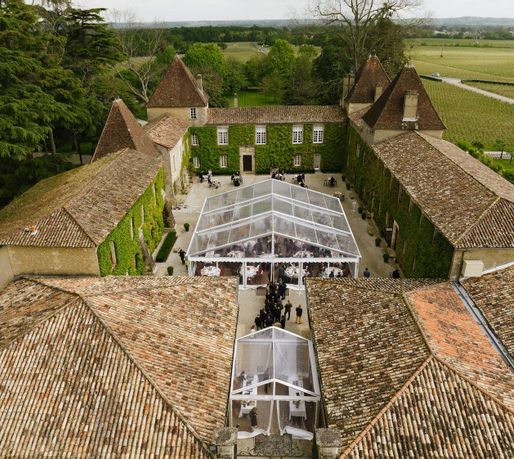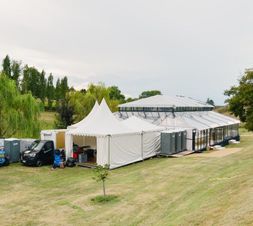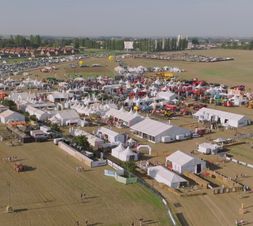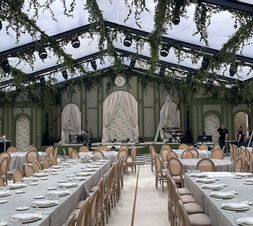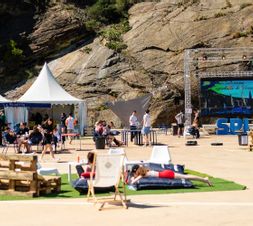The complete checklist for organizing your event

Organizing an event is always synonymous with excitement, whether it’s a wedding, a commercial success, the launch of a new product, or the inauguration of a new headquarters. But how can you ensure that this day is a success?
Planning everything is crucial, but it’s even more important to know where to start and how to anticipate the unpredictable. The venue, furniture, infrastructure, cloakroom, stage, sound, video, energy, lighting, catering… the list of elements to consider is long.
We share our secrets with you and guide you step-by-step to ensure your event runs smoothly. Over 2000 clients have already trusted us—individuals, businesses, communities, event organizers… It’s your turn now. Follow our checklist!
Planning:
- Determine the theme and objective of the event.
- Choose the event venue:
- Type of venue: A private location, a hotel, a space within my company (meeting room, terrace…), a rented location for the occasion (castle, estate, vineyard…), a public place.
- Location: Indoor, outdoor, or both.
- Define the event date.
- Set the event budget.
- Prepare the guest list.
- Plan the program: cocktail, sit-down dinner, speeches, entertainment, etc.
- Write a communication plan: website, social media, press release, communication materials, etc.
- Select the service providers: structures and tents, catering, decoration, technical equipment, etc.
- Arrange transportation and accommodation for guests.
- Prepare the necessary administrative documents and licenses.
- Plan a timeline and distribute tasks among team members: before the event, on the day, and after the event.
- Establish a point of contact for the event who centralizes information and liaises with service providers and participants.
Setup (logistics):
Layout
- Assess the space needed for your event and the locations where it will take place (garden, tent, castle hall):
- For different moments: ceremony, cocktail, dinner, dance floor.
- For technical installations: outdoor toilets, DJ, technical control.
- Manage guest flow:
- For guests: venue accessibility, parking, entrance, and reception area.
- For service providers: access to the venue (if different from guest access), parking (if different from guest parking), access constraints (type of ground, elevator…) and storage area.
Installation
- Tent and floor
- Size (according to dedicated spaces): seated meals, dance floor, lounge area, orchestra, conference, product display, etc.
- Type of tent (crystal, silhouette, orangery, etc.): to be chosen based on the desired theme and weather conditions.
- Type of terrain: lawn, hard ground, rooftop.
- Type of flooring: placing the tent directly on existing ground or on a floor, carpet, or other.
- Access for materials to the installation area: road and path width, passing under a bridge, navigating inside cities.
- Decoration
- Dressing the environment: tent (poles, walls, interior/exterior roof, skirting), floor, cloakrooms, catering, etc.
- Decoration elements:
- Lighting: string lights, chandeliers, spotlights, vegetation, safety (evacuation).
- Floral scenography: centerpieces, arches, chuppah.
- Branding, if a company event: printed banners, tent dressing with the company logo.
- Furniture and tableware
- Spaces requiring furniture: reception, meals, lounge area, cloakrooms, etc.
- Catering: dinner, cocktail, breakfast, lunch.
- Equipment: tables (round, rectangular, oval), chairs, bars, plates, tablecloths, etc.
- Storage space for equipment.
- Energy:
- Check the venue’s energy capacity.
- Need for a generator or not.
- Need for heating or air conditioning.
- Technical:
- Sound: DJ / Band, speeches (podiums, microphones, amplifiers).
- Video: number of screens, type of screens, content.
- Sanitary facilities:
- Ensure there are adequate sanitary facilities at the venue.
- Choose the type of sanitary facilities and their location: cabins, caravans, block.
Dismantling:
- Organize in advance the order of intervention for service providers.
- Plan for the removal of decoration elements, furniture, tableware, waste, and cleaning.
- Ensure the venue’s security until the keys are handed over.
- Make sure the venue is returned as it was provided.
- Conduct an exit inspection.
Post-Event:
- Thank the service providers, guests, and clients.
- Organize photo and video reporting.
- Complete the financial closure.
- Analyze the event’s outcomes and share them with the concerned parties.
With a wide range of event tents and structures, endless customization options, and high-quality turnkey service, the entire Atawa team is here to support you at every step from conception to the realization of your private and professional events.


 Phone
Phone
